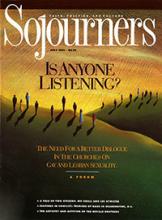Even a news junkie like myself can overdose on information. And commercial television channels have been feeding the addiction as a way to offset their current financial crises. But there reaches a point when even I don't want to turn on the television.
That would be a mistake, especially this summer.
It All Depends On Your ...
P.O.V., an award-winning independent documentary film series, begins its fourth season on public television in mid-June. This year, as in past years, the documentaries convey a "point of view" via the personal stories of people who definitely have a story to tell.
The series opens June 18 (check local listings) with an absolutely powerful documentary, Absolutely Positive, the story of a number of people who have tested HIV positive. The director of the film, Peter Adair, himself HIV positive, shows talking heads that soon become talking friends. Through 11 voices -- male and female; heterosexual and homosexual; Asian American, African American, and Anglo American -- this film demonstrates the diversity of those who are affected by the AIDS virus.
Because the AIDS crisis is so identified in the public mind with the gay community, Adair begins with interviews with several men who describe how the newly liberated gay community was quickly shaken by the identification of the HIV virus. But many straight people have also felt the effects of AIDS. Intravenous drug users and blood transfusion recipients also discuss the ways that the virus has changed their lives.
Read the Full Article
